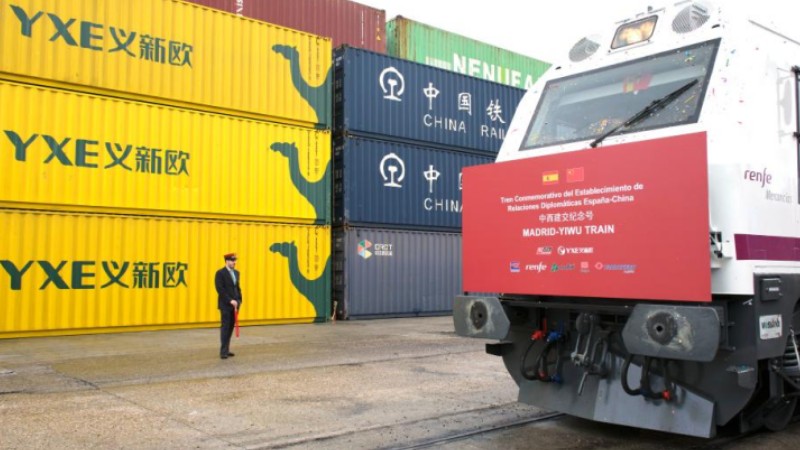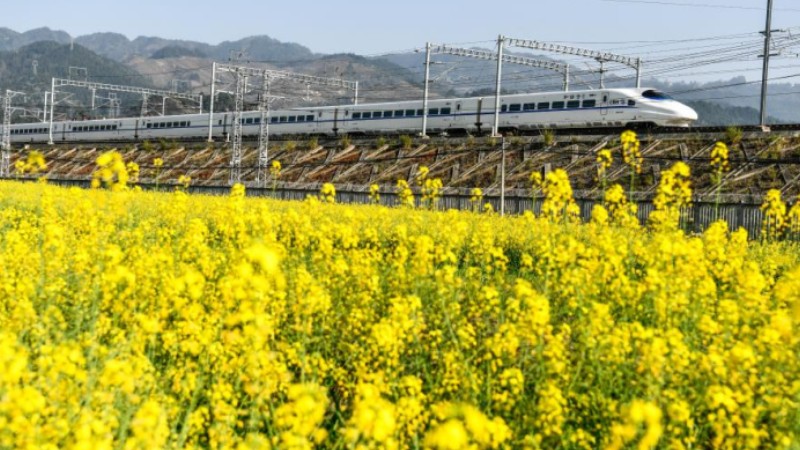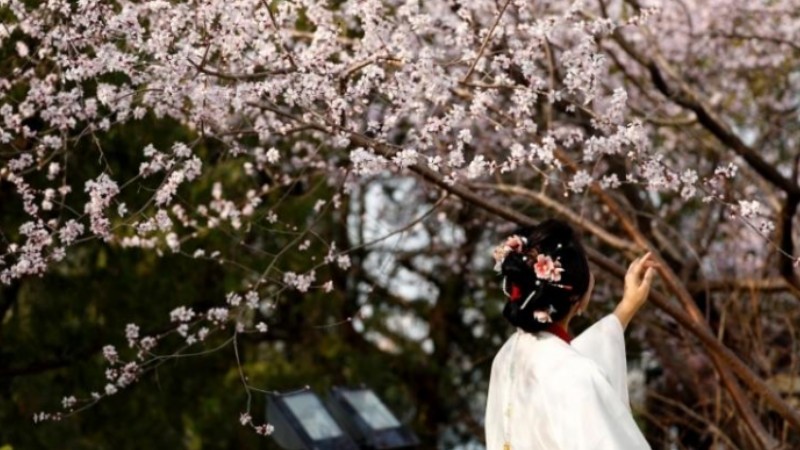Japan's nuke wastewater discharge plan batters fishermen's livelihoods, angers global community
* In a public opinion survey conducted earlier this month, 90.5 percent of Fukushima residents believed that dumping nuclear-contaminated wastewater into the ocean would cause reputational damage to the area's products.
* Susceptible to the wastewater issue are the Pacific island countries that have been scarred with painful memories since Western countries have conducted a dazzling array of nuclear tests in the Pacific since the mid-20th century, resulting in shocking radioactive pollution and ecological disasters.
* "The Pacific Ocean does not belong to Japan but to everybody. Pollutants will flow to neighboring countries where many radioactive materials have already been released and contaminated (the marine ecosystem)."
TOKYO, March 12 (Xinhua) -- Despite raging opposition both at home and abroad, Japan still intends to push ahead with its plan to dump nuclear-contaminated wastewater into the Pacific Ocean from the wrecked Fukushima Daiichi nuclear power plant in this spring or summer.
Local residents, especially those in the fishery industry, believe the discharge will wreck their livelihoods and all the efforts they have made for over a decade to revive the industry, let alone the international outcry over the irresponsible decision.

A sign that reads "do not dump contaminated wastewater into the sea" is pictured during a protest near the headquarters of Tokyo Electric Power Company (TEPCO) in Tokyo, Japan. (Xinhua/Zhang Xiaoyu)
DECADE-LONG EFFORTS FOR NAUGHT
"We are dead against the release," said Toshimitsu Konno, head of Fukushima prefecture's Soma Futaba Fisheries Cooperative Association. "Once the contaminated water is discharged, our decade-long efforts must start all over again."
The group, with 846 members, is the largest in the northeastern prefecture, the worst-hit area by a magnitude-9.0 earthquake and an ensuing tsunami on March 11, 2011.
The Fukushima Daiichi nuclear power plant then suffered core meltdowns that released radiation, resulting in a level-7 nuclear accident, the highest on the International Nuclear and Radiological Event Scale.
The plant has been generating a massive amount of water tainted with radioactive substances from cooling down the nuclear fuel in the reactor buildings, which are now stored in about 1,000 storage tanks.
The plant's operator Tokyo Electric Power Company (TEPCO) has repeatedly claimed that the treated water it plans to discharge is diluted to national safety standards.

People hold signs which bear messages against the dumping of nuclear-contaminated wastewater into the Pacific Ocean during a protest near the headquarters of Tokyo Electric Power Company (TEPCO) in Tokyo, Japan, March 11, 2023. (Xinhua/Zhang Xiaoyu)
"The wastewater is poison no matter how hard you dilute it, as it contains radioactive substances," said Haruo Ono, a fisherman at the small port of Shinchimachi, north of the plant.
"The sea has nurtured us. It is the home of fish rather than a dustbin for humans! Why should we pollute the ocean?" the 70-year-old asked.
The third-generation fisherman, who lost his house and younger brother during the tsunami, felt furious as the discharge might ruin everything when the local fishing sector is gradually recovering.
Twelve years after the 2011 accident traumatized Fukushima's fishing industry, local fishermen are still struggling.
According to Konno, catches in the area are now equivalent to only 20 percent of the volume before the 2011 earthquake, although fish prices have recovered 70 to 80 percent of the pre-earthquake level.
"All fishermen are against the discharge," said local fisherman Kenichiro Oohira. "Once the contaminated water is released, all the efforts we fishermen have made for over ten years to restore consumers' confidence will end in vain."
In a public opinion survey conducted earlier this month, 90.5 percent of Fukushima residents believed that dumping nuclear-contaminated wastewater into the ocean would cause reputational damage to the area's products.
"Locals are working very hard to revive the Fukushima fishery. All such efforts would come to naught if even one of the millions of fish caught exceeded the radioactive limit," said Kenichi Oshima, a professor at Ryukoku University.
"We are living off the sea both as producers and consumers," Takeshi Komatsu, an oyster breeder in the neighboring Miyagi prefecture, expressed concern that the wastewater will contaminate the oysters and put local food and children's safety at risk.

Fishermen wait for the return of fishing ships at the Haragama local distributor market in Soma city of Fukushima prefecture, Japan, March 8, 2023. (Xinhua/Zhang Xiaoyu)
TREATED WATER MUCH QUESTIONABLE
Oshima pointed out that, unlike ordinary hazardous chemicals, radioactive substances will not disappear without chemical treatment as nature's self-purification is limited.
The environmental economist said it is an "indisputable fact" that these radioactive substances would not have been produced without the nuclear accident.
"I don't think it is appropriate to discharge these additional radioactive substances," he said, adding that "there is no corresponding assessment of the long-term impact of radioactive materials on the marine ecosystem and our lives."
He questioned the effectiveness of TEPCO's Advanced Liquid Processing System, saying that nuclides other than tritium have yet to be removed in about two-thirds of the total 1.3 million tons of the nuclear wastewater from the Fukushima Daiichi nuclear power plant.
"TEPCO insists that it will and can handle the issue, but the credibility of such statements needs further observation given there was no precedent," he noted, stressing that whether the treated one-third of nuclear wastewater meets standard also lacks review by a third-party organization.
He believed the proper and uncostly treatment is to continue storing treated nuclear wastewater in tanks and wait for tritium, with a half-life of 12.3 years, to decay to less than one-thousandth of its current level in more than 120 years. Another method is to seal it underground upon mortar solidification and wait for more than 100 years, at which point further treatment methods can be considered.
Since TEPCO is responsible for the accident in the first place, it should not choose how to dispose of the water based on cost calculations. Instead, it must minimize the impact on the environment and people, Oshima noted.

This photo taken on March 6, 2023 shows the Fukushima Daiichi nuclear power plant seen from Futabacho, Futabagun, Fukushima prefecture, Japan. (Xinhua/Zhang Xiaoyu)
INT'L OUTCRY OVER RECKLESS PLAN
More than backlash at home, Japan's move has raised serious concerns worldwide, generating strong opposition from many countries and international organizations.
Academics and environmental advocates worry that Japan's unilateral push of the plan is reckless and harmful, citing a lack of a practical demonstration and its potential threat to society and marine ecology.
Susceptible to the wastewater issue are the Pacific island countries that have been scarred with painful memories since Western countries have conducted a dazzling array of nuclear tests in the Pacific since the mid-20th century, resulting in shocking radioactive pollution and ecological disasters.

File photo taken on Oct. 12, 2017 shows huge tanks that store contaminated radioactive wastewater at the Fukushima Daiichi nuclear plant in Fukushima prefecture, Japan. (Xinhua)
"We must prevent action that will lead or mislead us toward another major nuclear contamination disaster at the hands of others," said Henry Puna, secretary general of the Pacific Islands Forum, stressing that it is crucial for the Pacific that Japan does not go ahead with the release.
Leaders from multiple Pacific island countries call upon the Japanese government to immediately stop its plans to dump nuclear waste into the Pacific Ocean.
Fiji's Acting Prime Minister Manoa Kamikamica said that Fiji has been on very high alert since Japan announced the planned release, asking if the water treated by the Advanced Liquid Processing System is safe, and "why not reuse it in Japan for alternative purposes, in manufacturing and agriculture for instance?"
"Pacific peoples have a fundamental right to a clean, healthy, and sustainable environment. By proceeding with this plan to discharge radioactive wastewater without community-led consultation, rigorous scientific debate, and public deliberation, TEPCO and the Japanese government are showing direct disregard for the sovereignty and self-determination of Pacific peoples," New Zealand sociologist Karly Burch said.
David Krofcheck, senior lecturer in physics at the University of Auckland, said that the danger of indiscriminately releasing nuclear fission products into the ocean is that they can find their way into the food chain, warning of rising cancer.
Li Song, China's permanent representative to the International Atomic Energy Agency (IAEA), said the issue is highly controversial and needs to be thoughtfully and prudently addressed by the international community and member states of the IAEA.
"The Pacific Ocean does not belong to Japan but to everybody," said Ahn Jae-hun, energy and climate change director at the Korea Federation for Environment Movement. "Pollutants will flow to neighboring countries where many radioactive materials have already been released and contaminated (the marine ecosystem)."
Photos
Related Stories
- Interview: Japan's contaminated wastewater discharge plan inappropriate, says Japanese scholar
- Japan's GDP growth downgraded to annualized real 0.1 pct in Q4 2022
- China urges Japan not to arbitrarily discharge nuclear-contaminated water
- China urges Japan to consult with stakeholders on nuclear-contaminated water discharge
- China urges Japan to responsibly dispose of nuclear wastewater: FM
Copyright © 2023 People's Daily Online. All Rights Reserved.









